The story of Hua Mulan originates from a Chinese ancient folk. Discover the inspiring tale of Hua Mulan, a legendary Chinese warrior who disguised herself as a man to serve in the army in place of her aging father. Join us as we explore this classic Chinese folktale and learn Mandarin along the way. legend and tells the tale of a woman who takes her father’s place in the army. Let’s learn Mandarin through this interesting story with Ni Hao Ma.
The main plot of Hua Mulan story
从前,有个武艺高强的姑娘叫花木兰。她年轻漂亮,还有一手好箭法
Cóngqián, yǒu gè wǔyì gāoqiáng de gūniáng jiào huā mùlán. Tā niánqīng piàoliang, hái yǒuyīshǒu hǎo jiàn fǎ.
Once upon a time, there was a skilled and talented girl named Hua Mulan. She was young, beautiful, and had a talent for archery.
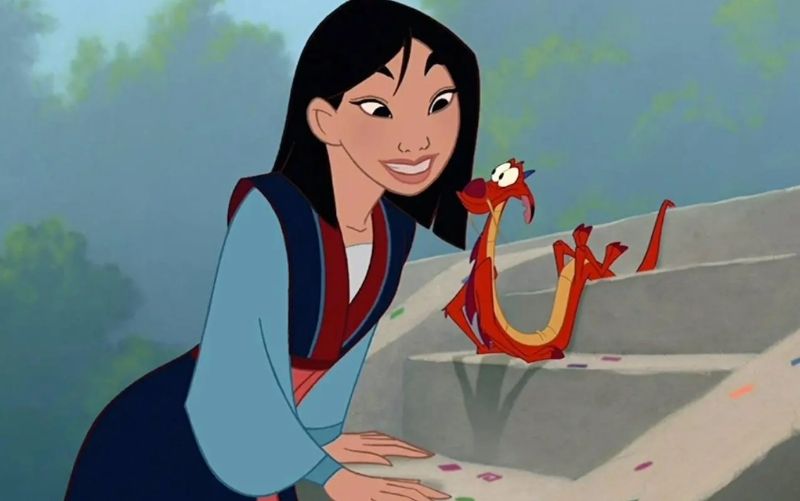
一天,花木兰正在屋里织布,忽然听见外面有马蹄声。她走出屋子,只见一个军官从马上下来,递给她一份公文。
Yītiān, huā mùlán zhèngzài wū li zhī bù, hūrán tīngjiàn wàimiàn yǒu mǎtí shēng. Tā zǒuchū wūzi, zhǐ jiàn yīgè jūnguān cóng mǎshàng xiàlái, dì gěi tā yī fèn gōngwén.
One day, while Hua Mulan was weaving inside her house, she suddenly heard the sound of horse hooves outside. She walked out of the house and saw a military officer dismounting from his horse, handing her a document.
军官说,边疆正在打仗,可汗命令征兵。你们家有一个人的名字在公文上
Jūnguān shuō, biānjiāng zhèngzài dǎzhàng, kè hán mìnglìng zhēngbīng. Nǐmen jiā yǒu yīgèrén de míngzì zài gōngwén shàng.
The military officer said that there was a war going on at the border, and the Khan had ordered conscription. Your family’s name is listed on the document with one person’s name.
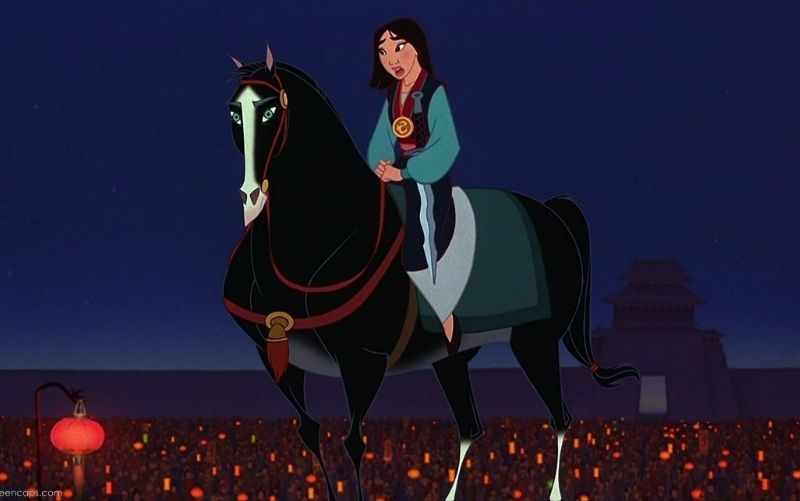
木兰翻开一看,爹爹的名字在上面。花木兰回到屋里,左思右想,爹爹的年岁大了,弟弟还小,怎能出兵打仗呢?
Mùlán fān kāi yī kàn, diēdiē de míngzì zài shàngmiàn. Huā mùlán huí dào wū li, zuǒsī yòu xiǎng, diēdiē de nián suì dàle, dìdì hái xiǎo, zěn néng chūbīng dǎzhàng ne?
Mulan opened it and saw that her father’s name was on it. She went back into the house, pondering over it. Her father was old, and her younger brother was still young. How could they go to war?
Note: The sentence “左思右想” is a Chinese idiom that means “to ponder over something from every angle“
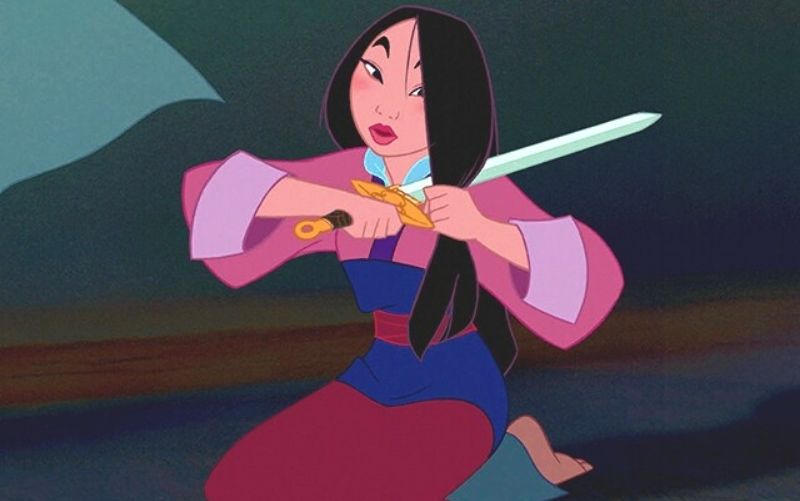
花木兰一夜没有合眼,思来想去,终于想出了一个办法。
Huā mùlán yīyè méiyǒu héyǎn, sī lái xiǎng qù, zhōngyú xiǎng chūle yī gè bànfǎ.
Hua Mulan didn’t sleep a wink all night, thinking and thinking. After much deliberation, she finally came up with a solution.
第二天,花木兰上街买了一匹马,赶做了一身战袍,又剪了头发,装扮成小伙子
Dì èr tiān, huā mùlán shàng jiē mǎile yī pī mǎ, gǎn zuòle yīshēn zhàn páo, yòu jiǎnle tóufa, zhuāngbàn chéng xiǎohuǒzi.
The next day, Hua Mulan went to the market and bought a horse. She quickly made a set of battle armor and cut her hair short, disguising herself as a young man.
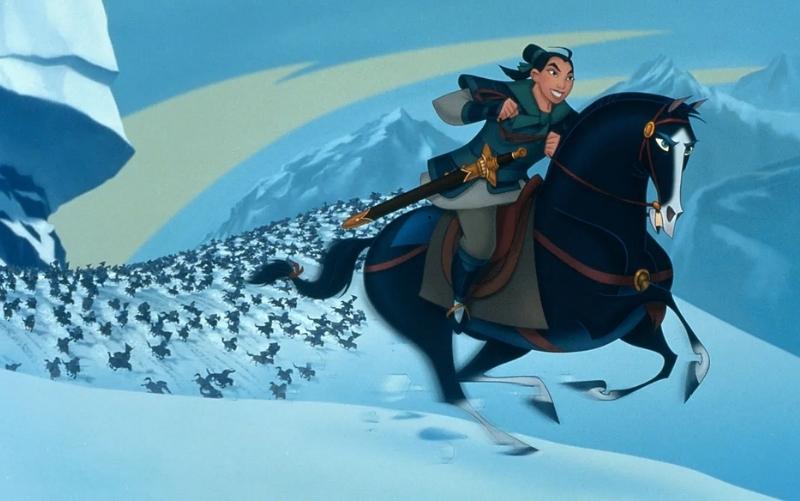
连父母和弟弟们都认不出她了,他们不忍心让木兰去打仗,可是也没别的办法,只好和木兰挥泪告别。
Lián fùmǔ hé dìdìmen dōu rèn bù chū tāle, tāmen bù rěnxīn ràng mùlán qù dǎzhàng, kěshì yě méi bié de bànfǎ, zhǐhǎo hé mùlán huī lèi gàobié.
Even her parents and younger siblings didn’t recognize her. They couldn’t bear to let Mulan go to war, but they had no other choice. They tearfully said goodbye to Mulan.
于是花木兰随着大军到边疆打仗去了,战场上的花木兰一点儿不比男儿差。她历经百战,挥汗流血,凭着她的机智勇敢和超群的武艺,花木兰一次次立下了战功,最后被封为将军。
Yúshì huā mùlán suízhe dàjūn dào biānjiāng dǎzhàng qùle, zhànchǎng shàng de huā mùlán yīdiǎnr bùbǐ nán’ér chà. Tā lìjīng bǎi zhàn, huī hàn liúxuè, píngzhe tā de jīzhì yǒnggǎn hé chāoqún de wǔyì, huā mùlán yīcì cì lì xiàle zhàngōng, zuìhòu bèi fēng wéi jiāngjūn.
So Hua Mulan went to the border with the army to fight. On the battlefield, Hua Mulan was no less competent than any man. She fought in countless battles, shedding blood and sweat. With her wit, courage, and exceptional martial arts skills, Hua Mulan made numerous military achievements, and in the end, she was promoted to the rank of general.
这场战争一打就是十二年,大军终于胜利归来,可汗亲自召见了花木兰,要封她做大官,但花木兰想念亲人,她谢过可汗,就和几个一起打仗的好伙伴回家乡了。
Zhè chǎng zhànzhēng yī dǎ jiùshì shí’èr nián, dàjūn zhōngyú shènglì guīlái, kè hán qīnzì zhàojiànle huā mùlán, yào fēng tā zuò dà guān, dàn huā mùlán xiǎngniàn qīnrén, tā xièguò kè hán, jiù hé jǐ gè yīqǐ dǎzhàng de hǎo huǒbàn huí jiāxiāngle.
The war lasted for twelve years, and the army finally returned home victorious. The Khan personally summoned Hua Mulan and offered her a high-ranking position, but Hua Mulan was homesick. She thanked the Khan but declined the offer, choosing to return to her hometown with some of her good comrades whom she fought with.
父母听到木兰要归来的喜讯,高兴地来到村口迎接。弟弟也长大了,正在家里杀猪宰羊,准备犒劳凯旋的姐姐。
Fùmǔ tīng dào mùlán yào guīlái de xǐxùn, gāoxìng de lái dào cūnkǒu yíngjiē. Dìdì yě zhǎng dàle, zhèngzài jiālǐ shā zhū zǎi yáng, zhǔnbèi kào láo kǎixuán de jiějie.
When Mulan’s parents heard the good news of her return, they joyfully went to the village entrance to welcome her. Her younger brother had grown up and was preparing a feast of killing pigs and sheep at home to celebrate his victorious sister’s return.
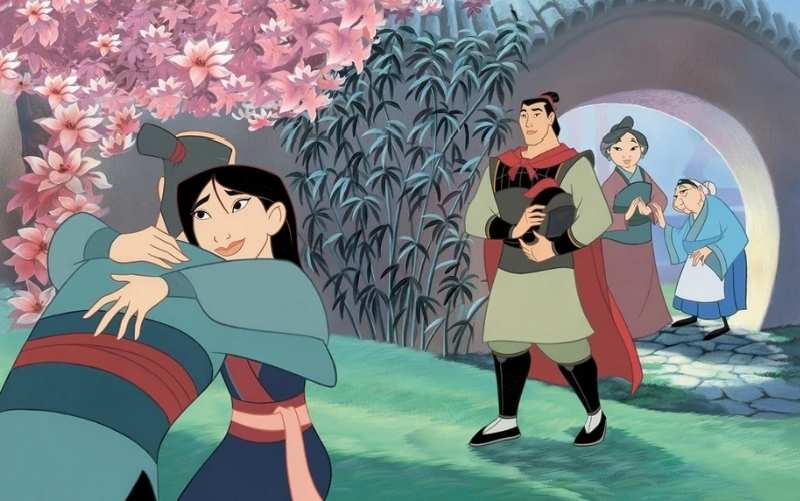
花木兰终于到家了,她回屋换上以前的青布衣裙,和她一起打仗的伙伴们看到后,个个都看呆了。
Huā mùlán zhōngyú dàojiāle, tā huí wū huàn shàng yǐqián de qīng bùyī qún, hé tā yīqǐ dǎzhàng de huǒbànmen kàn dào hòu, gè gè dōu kàn dāile.
Hua Mulan finally arrived home, changed into her old blue dress in her room. When her comrades who fought with her saw her, they were all stunned.
他们怎么也没有想到,和他们并肩作战十多年的花木兰竟是个漂亮的姑娘。
Tāmen zěnme yě méiyǒu xiǎngdào, hé tāmen bìngjiān zuòzhàn shí duō nián de huā mùlán jìng shìgè piàoliang de gūniáng.
They never imagined that Hua Mulan, who fought side by side with them for more than a decade, was actually a beautiful girl.
Exploring the Deeper Themes and Symbolism of Hua Mulan
Theme 1: Gender Roles and Expectations (性别角色和期望)
The story of Hua Mulan challenges traditional gender roles and expectations in Chinese society. By disguising herself as a man, Mulan defies societal norms and proves that women are capable of achieving great things. Her success in the army not only undermines stereotypes but also highlights the limitations imposed on women during that time.
Theme 2: Patriotism and Sacrifice (爱国主义与牺牲精神)
Mulan’s decision to take her father’s place in the army demonstrates her deep sense of patriotism and filial piety. She is willing to sacrifice her own happiness and safety for the sake of her family and country. Her actions highlight the importance of loyalty and duty in Chinese culture.
Theme 3: Individuality and Self-Discovery (个性与自我发现)
Mulan’s journey of self-discovery is a central element of the story. By disguising herself as a man, she is forced to confront her own identity and question the societal expectations placed upon her. Her experiences in the army allow her to develop her strength, courage, and independence.
Theme 4: The Power of Disguise and Deception (伪装和欺骗的力量)
The motif of disguise plays a significant role in the story. By concealing her true identity, Mulan is able to navigate a world that is dominated by men. Her disguise represents a form of empowerment, allowing her to challenge societal norms and achieve her goals.
Symbolism: The Mulan Poem
The story of Hua Mulan is often associated with a famous Chinese poem. The poem contains many symbolic elements, such as the “north wind” which represents hardship and adversity, and the “south wind” which represents comfort and home. The poem also emphasizes the importance of loyalty, duty, and sacrifice.
Conclusion
Hua Mulan’s journey from a young woman to a celebrated warrior is more than just an exciting tale. It’s a testament to the enduring human spirit and a challenge to societal norms. Her decision to disguise herself and fight for her country reveals profound themes of gender roles, patriotism, personal growth, and the power of identity.
Beyond the surface-level adventure, Mulan’s story offers a rich tapestry of symbolism. The battlefield represents the challenges and struggles we face in life, while her disguise symbolizes the potential within each of us to break free from societal expectations. The return home signifies the completion of a cycle and the importance of one’s roots.
Interested in exploring more interesting topics and Mandarin vocabulary? Read more at Ni Hao Ma blog for engaging lessons and useful tips to achieve your objective.



